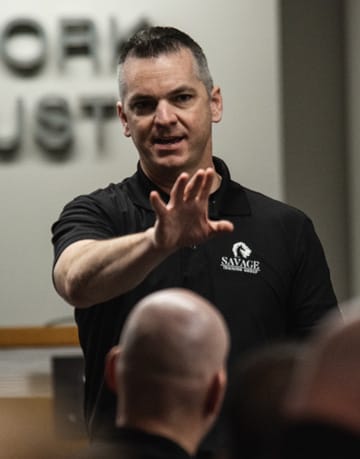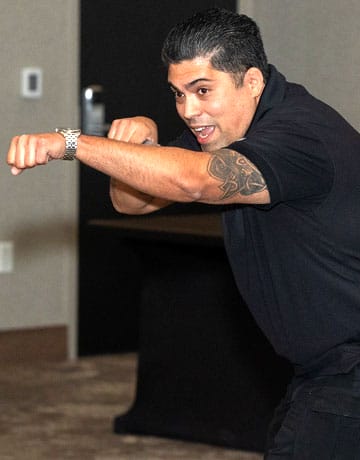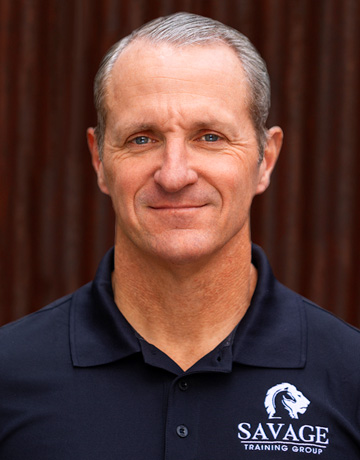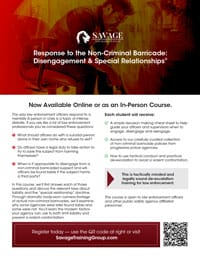Response to the Non-Criminal Barricade®
Disengagement & Special Relationships
Online and In-Person Training
This course teaches law enforcement officers and supervisors the best way to respond to mentally ill persons who are armed, barricaded, and in crisis. Students will leave the course with an understanding of modern disengagement and re-engagement tactics, the specific ways to avoid liability, and a collection of the best non-criminal barricade policies from police agencies all around the country.
If you are like a lot of law enforcement professionals you have considered these questions:
- What should officers do with a suicidal person alone in their own home who refuses to exit?
- Do officers have a legal duty to take action to try to save the subject from harming themselves?
- When is it appropriate to disengage from a non-criminal barricaded suspect and will officers be liable if the subject harms a third party?
The way law enforcement officers respond to a mentally ill person in crisis is a topic of intense debate. In this course, we’ll first answer each of those questions and discuss the relevant laws about liability and the “special relationship” doctrine. Then we will examine several case studies, some which resulted in the agency being found liable and some where the agency was not. You will see real world videos from dramatic incidents when the police disengaged, and some when they should have. You’ll learn the modern tactics your agency can use to both limit liability and prevent a violent confrontation.
Each student will receive:
- An understanding of your state’s laws regarding the public duty doctrine, special relationships, liability, and duty
- A decision-making cheat sheet for disengagement
- Policies, a police report template, and a script to use to sever special relationships
Two Ways to Attend This Course:
In-Person Course
Online Course
Upcoming Presentations:
Response to the Non-Criminal Barricade
Aug 12 • Troy, MI
Aug 12 • Schaumburg, IL
Aug 29 • Pittsburgh, PA
Sep 4 • Westminster, CA
Oct 11 • Milpitas, CA
Oct 25 • Lafayette, LA
Oct 25 • Charlotte, NC
Oct 28 • Rocklin, CA
Nov 6 • Ocala, FL
Nov 8 • Davie, FL
Nov 18 • San Diego, CA
Dec 17 • West Bloomfield, MI
Mar 18 • Simi Valley, CA
Your Instructors

Scott Savage is a recognized expert in the response to non-criminal barricades. Scott is an experienced law enforcement officer who has not only commanded these types of incidents in the field, but also trains officers all over California and beyond on how to do the same. His study of the subject has included gathering response protocols from agencies both in and outside of California. Scott is a dynamic speaker who is passionate about bringing this important information to the law enforcement community.


What our students are saying:
Realistic De-escalation & Tactical Withdrawal Training
Most every police agency is searching for de-escalation training for law enforcement. But the best agencies want training that isn’t just “check the box” training. This course delivers! Instead of vague philosophical notions about de-escalation, this course presents specific guidance that your officers can put to use immediately. Looking for meaningful tactical withdrawal training or mental health crisis response training? This course will give your officers and supervisors specific tools they can use to save lives and prevent liability.
Target Audience
The target audience for this course are:
- Patrol Officers and Field Supervisors – When it comes to de-escalation training for law enforcement, your front-line personnel need the best decision-making tools.
- Hostage and Crisis Negotiators – There is huge need for advanced training courses for hostage negotiators and this course delivers.
- Law Enforcement Policy Makers – Students in this course receive immediate access to our collection of the best non-criminal barricade policies from across the US.
- Law Enforcement Dispatchers and Call Takers – Liability often attaches when promises are made to an individual. Public Safety Communications staff need to know what to avoid saying to a caller before the police arrive. Without this training, your call takers may be triggering the “special relationships” doctrine and not even know it.
The reason this course is ideal for police dispatchers and call takers is simply this; liability often attaches when promises are made to an individual. Public Safety Communications staff need to know what to avoid saying to a caller before the police arrive. Without this training, your call takers may be triggering the “special relationships” doctrine and not even know it.
